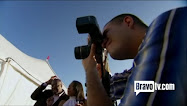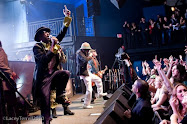 Salsa megastar Rivera has fans dancing in the aisles
Salsa megastar Rivera has fans dancing in the aisles By Alfredo Flores
THE WASHINGTON TIMES
Published November 27, 2006
They came in droves and waited patiently for hours for the show to start. Then, just before 1 a.m. in the Washington Hilton's International Ballroom yesterday, finally, the trademark chant began, "Jeeer-ry, Jeeer-ry, Jeeer-ry." While it may have sounded like the beginning of a Jerry Springer show, if you listened closely there was a distinct Spanish accent to this particular Jerry chant -- in this case for Puerto Rican salsa megastar Jerry Rivera. In a scene reminiscent of New York City's famed Copacabana salsa club, the Hilton provided Mr. Rivera with the perfect setting to perform not only in front of a packed house, but also for a wide variety of fans. Those with deep pockets sat up front at VIP tables, wining and dining before and during the show. Meanwhile, younger devotees danced the night away either between the narrow gaps of the tables or on the huge dance floor. The ruggedly good-looking singer, sporting jet black spiked hair, a tight muscle shirt and matching black pants, has developed a baby-faced golden-boy mystique as a young "prin
 ce of salsa" -- enough to get him named one of People magazine's "50 Most Beautiful People" and land roles in the American movie "I Like It Like That" as well as several Spanish telenovelas, television soap operas. Mr. Rivera has achieved much success in his nearly 20-year career, most notably for his 1992 album "Cuenta Conmigo (Count on Me)," which won three Platinum Record awards in the U.S., Puerto Rico, and Colombia and became the No. 1 selling salsa album of all-time. It contains the powerful "Como El Nuestro (Like our Love)," whose distinctive horn rhythm was sampled in the chorus of Shakira's megahit "Hips Don't Lie." Mr. Rivera, 33, did not fail to project the warm, friendly manner that sets him apart from his blander, monotonal elders in the romantic salsa genre. Several ladies in the audience swooned at his Rivera's love ballads, including "Esa Nina (That Girl)," "Me Estoy Enloqueciendo Por Ti (Going Crazy for You)," "Dime (Tell Me)" and "Como un Milagro (Like a Miracle)." Although his vocals were sharp, his microphone tended to give static feedback on longer notes. Perhaps because he was forced to play solo instead of being one of a twin-bill of Puerto Rican performers (merengue star Elvis Crespo was unable to catch a flight to Washington after a concert in Venezuela), Mr. Rivera did a bit too much talking with the audience and took his time in between songs, most likely a tactic used to extend the length of the show. The mood of the performance, outside the ballroom, also heated up. At around 12:45 a.m., when the announcement was made that Mr. Crespo would not be able to perform, several of the concert-goers pushed and shoved while demanding a full refund. Several officials from the local event management company, Oscar's Production, had to be taken away by security for their safety. The evening was also marked by the sort of chaos one might expect at Mr. Springer's show when several enthusiastic female fans mobbed and then mercilessly kissed and hugged the singer onstage before being whisked off by beefy security guards. Mr. Rivera, however, did his best to bow to the wishes of the audience, posing for countless pictures, and even dancing with a couple of his fans.
ce of salsa" -- enough to get him named one of People magazine's "50 Most Beautiful People" and land roles in the American movie "I Like It Like That" as well as several Spanish telenovelas, television soap operas. Mr. Rivera has achieved much success in his nearly 20-year career, most notably for his 1992 album "Cuenta Conmigo (Count on Me)," which won three Platinum Record awards in the U.S., Puerto Rico, and Colombia and became the No. 1 selling salsa album of all-time. It contains the powerful "Como El Nuestro (Like our Love)," whose distinctive horn rhythm was sampled in the chorus of Shakira's megahit "Hips Don't Lie." Mr. Rivera, 33, did not fail to project the warm, friendly manner that sets him apart from his blander, monotonal elders in the romantic salsa genre. Several ladies in the audience swooned at his Rivera's love ballads, including "Esa Nina (That Girl)," "Me Estoy Enloqueciendo Por Ti (Going Crazy for You)," "Dime (Tell Me)" and "Como un Milagro (Like a Miracle)." Although his vocals were sharp, his microphone tended to give static feedback on longer notes. Perhaps because he was forced to play solo instead of being one of a twin-bill of Puerto Rican performers (merengue star Elvis Crespo was unable to catch a flight to Washington after a concert in Venezuela), Mr. Rivera did a bit too much talking with the audience and took his time in between songs, most likely a tactic used to extend the length of the show. The mood of the performance, outside the ballroom, also heated up. At around 12:45 a.m., when the announcement was made that Mr. Crespo would not be able to perform, several of the concert-goers pushed and shoved while demanding a full refund. Several officials from the local event management company, Oscar's Production, had to be taken away by security for their safety. The evening was also marked by the sort of chaos one might expect at Mr. Springer's show when several enthusiastic female fans mobbed and then mercilessly kissed and hugged the singer onstage before being whisked off by beefy security guards. Mr. Rivera, however, did his best to bow to the wishes of the audience, posing for countless pictures, and even dancing with a couple of his fans.



































